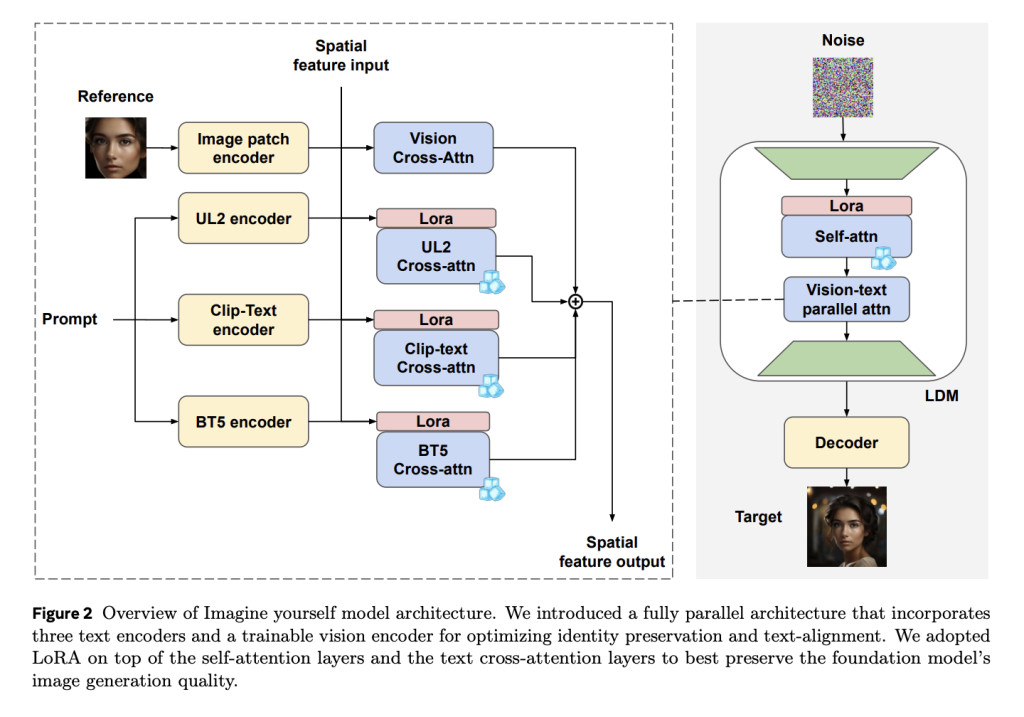Personalized image generation is gaining traction due to its potential in various applications, from social media to virtual reality. However, traditional methods often require extensive tuning for each user, limiting efficiency and scalability. Imagine Yourself, an innovative model that overcomes these limitations by eliminating the need for user-specific fine-tuning, enabling a single model to cater to diverse user needs. This model addresses the shortcomings of existing methods, such as their tendency to replicate reference images without variation, paving the way for a more versatile and user-friendly image generation process. Imagine Yourself excels in key areas like identity preservation, visual quality, and prompt alignment, significantly outperforming previous models.
Current personalized image generation methods often rely on tuning models for each user, which is inefficient and lacks generalizability. While newer approaches attempt to personalize without tuning, they often overfit, leading to a copy-paste effect. Meta researchers introduced Imagine Yourself, a novel model that enhances personalization without needing subject-specific tuning. Key components include synthetic paired data generation to encourage diversity, a fully parallel attention architecture integrating three text encoders and a trainable vision encoder, and a coarse-to-fine multi-stage fine-tuning process. These innovations allow the model to generate high-quality, diverse images while maintaining strong identity preservation and text alignment.
Imagine Yourself extracts identity information using a trainable CLIP patch encoder and integrates it with textual prompts via a parallel cross-attention module, ensuring accurate identity preservation and response to complex prompts. The model uses low-rank adapters (LoRA) to fine-tune only specific parts of the architecture, maintaining high visual quality.
A standout feature of Imagine Yourself is its synthetic paired (SynPairs) data generation. By creating high-quality paired data that includes variations in expression, pose, and lighting, the model can learn more effectively and produce diverse outputs. Notably, it achieves a remarkable +27.8% improvement in text alignment compared to state-of-the-art models when handling complex prompts.
Researchers used a set of 51 diverse identities and 65 prompts to evaluate Imagine Yourself quantitatively, generating 3,315 images for human evaluation. The model was benchmarked against state-of-the-art (SOTA) adapter-based and control-based models, focusing on metrics such as visual appeal, identity preservation, and prompt alignment. Human annotations rated the generated images based on identity similarity, prompt alignment, and visual appeal. Imagine Yourself demonstrated a significant +45.1% improvement in prompt alignment over the adapter-based model and a +30.8% improvement over the control-based model, reaffirming its superiority. While the control-based model excelled in identity preservation, it often relied on a copy-paste effect, resulting in less natural outputs despite high identity metrics.
The Imagine Yourself model represents a significant advancement in personalized image generation. This model addresses critical challenges faced by previous methods by eliminating the need for subject-specific tuning and introducing innovative components such as synthetic paired data generation and a parallel attention architecture. Its superior performance in preserving identity, aligning with prompts, and maintaining visual quality marks a promising step forward for applications requiring personalized image creation. The research highlights the potential of tuning-free models and sets a new standard for future developments in this dynamic area of artificial intelligence.
Check out the Paper. All credit for this research goes to the researchers of this project. Also, don’t forget to follow us on Twitter and join our Telegram Channel and LinkedIn Group. If you like our work, you will love our newsletter..
Don’t Forget to join our 48k+ ML SubReddit
Find Upcoming AI Webinars here
The post Meta AI Proposes ‘Imagine yourself’: A State-of-the-Art Model for Personalized Image Generation without Subject-Specific Fine-Tuning appeared first on MarkTechPost.
Source: Read MoreÂ


